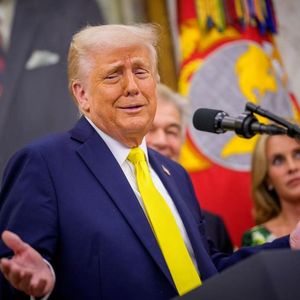Urgent discussions are underway as former U.S. President Donald Trump convenes a meeting with Japanese representatives to address critical issues concerning trade tariffs and defense spending. This high-stakes dialogue, confirmed by Walter Bloomberg on X, signals a pivotal moment in US-Japan relations and carries significant implications for the global economic landscape. With both treasury and commerce secretaries participating, the meeting underscores the multifaceted nature of these negotiations. But what exactly is on the table, and what could be the potential ripple effects of these discussions? Let’s delve into the intricacies of these vital talks. Decoding the Trump Japan Talks: Tariffs in the Spotlight Tariffs have long been a contentious point in international trade, and the upcoming Trump Japan talks are expected to heavily feature this issue. What are tariffs, and why are they so crucial in discussions between economic powerhouses like the U.S. and Japan? What are Tariffs? Simply put, tariffs are taxes imposed on imported goods and services. They are a tool used by governments to protect domestic industries, generate revenue, or exert political pressure. Historical Context of US-Japan Tariffs: The economic relationship between the U.S. and Japan has seen periods of both cooperation and friction, particularly concerning trade imbalances. Historically, the U.S. has sometimes levied tariffs on Japanese goods to address trade deficits and protect American industries from foreign competition. Current Tariff Landscape: While specific details of the tariffs to be discussed remain undisclosed, it’s anticipated that the focus might be on sectors where trade imbalances persist, such as automobiles or agricultural products. Any changes in tariffs could significantly alter the flow of goods between the two nations and impact global supply chains. Potential Impacts of Tariff Discussions Aspect Potential Positive Impacts Potential Negative Impacts For the U.S. May protect domestic industries, could lead to increased domestic production, potentially higher government revenue. Increased costs for consumers, retaliatory tariffs from Japan, strained trade relations, potential disruption to supply chains. For Japan Incentive to diversify export markets, pressure to innovate and become more competitive. Reduced exports to the U.S., negative impact on export-oriented industries, potential economic slowdown, strained diplomatic relations. Defense Spending Discussions: A Cornerstone of US-Japan Alliance Beyond trade, defense spending discussions are another critical component of the Trump-Japan meeting. The U.S.-Japan alliance is a cornerstone of security in the Asia-Pacific region, and the costs associated with maintaining this alliance are continually under review. Why is defense spending such a significant point of negotiation? The Security Alliance: The U.S. maintains a significant military presence in Japan, which is vital for regional stability, particularly in the face of growing geopolitical tensions. This presence is underpinned by mutual defense treaties and agreements. Cost-Sharing Arrangements: A key aspect of these discussions is the ‘burden-sharing’ of defense costs. The U.S. has historically sought to have allies, including Japan, increase their financial contributions to the costs of maintaining U.S. forces stationed in their countries. Trump’s Stance on Defense Spending: Former President Trump has consistently advocated for allies to bear a greater share of defense costs, often arguing that the U.S. is spending too much to protect other nations. This perspective is likely to shape the current discussions. What are the Potential Benefits and Challenges? These US Japan tariffs and defense spending negotiations present a complex web of potential benefits and challenges for both nations. Potential Benefits: For the U.S.: Economic Gains: Potentially fairer trade deals and reduced trade deficits. Increased Allied Contributions: Greater financial support from Japan for defense, freeing up U.S. resources. Political Leverage: Strengthening negotiating position in broader geopolitical strategies. For Japan: Strengthened Alliance: Reaffirming commitment to the US-Japan alliance, ensuring continued security support. Economic Adjustments: Opportunity to renegotiate trade terms that are more favorable or sustainable in the long run. Regional Influence: Maintaining a strong relationship with the U.S. enhances Japan’s influence in the Asia-Pacific region. Potential Challenges: Economic Disruption: Tariff changes could disrupt supply chains, raise consumer prices, and negatively impact businesses in both countries. Strained Relations: Aggressive negotiation tactics could strain diplomatic ties and create friction between the allies. Regional Instability: Disagreements over defense spending could weaken the security alliance and create uncertainty in the Asia-Pacific region. Global Economic Impact: Trade disputes between major economies like the U.S. and Japan can have ripple effects across the global economy, impacting other nations and markets. Actionable Insights: Navigating the Global Economic Implications For those in the cryptocurrency and broader financial markets, understanding these global economic implications is crucial. Here are some actionable insights: Monitor Market Reactions: Keep a close watch on how financial markets, including cryptocurrency markets, react to news and developments from the Trump-Japan talks. Trade policy shifts and defense spending adjustments can influence investor sentiment and market volatility. Diversify Investments: In times of economic uncertainty driven by trade tensions, diversification is key. Consider diversifying your investment portfolio across different asset classes and geographical regions to mitigate risks. Stay Informed: Follow reputable news sources and economic analysis to stay informed about the evolving dynamics of US-Japan relations and their potential impact on the global economy. Understanding the nuances of trade and defense policies can help you make more informed investment decisions. Consider Geopolitical Risks: Geopolitical events, such as shifts in alliances or trade disputes, can significantly impact market sentiment. Factor these risks into your investment strategies and risk management plans. Conclusion: A Pivotal Moment for US-Japan Relations and the World The urgent Trump-Japan talks on tariffs and defense spending represent a pivotal moment with far-reaching consequences. The outcomes of these discussions will not only reshape the bilateral relationship between the U.S. and Japan but also send significant signals across the global stage. As these negotiations unfold, their impact will be closely watched by governments, businesses, and investors worldwide. Understanding the potential shifts in trade relations, defense alliances, and global economic dynamics is essential for navigating the complexities of the modern world. To learn more about the latest global economic trends, explore our article on key developments shaping international trade and economic policy.

















